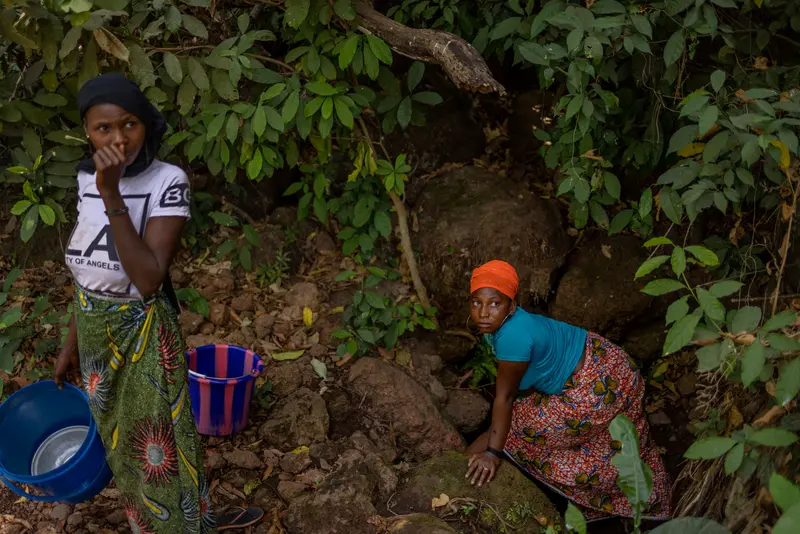Examining the unintended consequences of mining expansions on communities and wildlife in northwest Guinea.

by Lisa Song, with additional reporting by Jaime Yaya Barry for ProPublica, photography by Kathleen Flynn, special to ProPublicaJune 15, 2023, 5 a.m. EDTA fire breaks out in a field near homes in the village where residents of Hamdallaye, Guinea, have been relocated by Compagnie des Bauxites de Guinée. Residents say wildfires occur nearly twice a month during the dry season, a nuisance they didn’t have to endure in their previous homes.
The World Bank Group enabled the devastation of villages and helped a mining company justify the deaths of endangered chimps with a dubious offset.
ProPublica is a nonprofit newsroom that investigates abuses of power. Sign up to receive our biggest stories as soon as they’re published.
Part Four
Northwest Guinea
We’re investigating the cause of viruses spilling over from animals to humans — and what can be done to stop it. Read more in the series →
Several times a day, Hassanatou Bah scans for threats along the river’s edge near her village in northwest Guinea. The once-mundane chore of fetching water has become a territorial tug of war with an increasingly frightening foe: chimpanzees. Some days, she’s seen them hurl rocks from trees. Other times, they throw clusters of leaves containing nests of biting weaver ants.
Chimps had long encroached on Kagnèka, her farming community of about 350, but there was a time when residents could beat on gongs to scare them away. That changed about six years ago when a mining expansion drained streams and razed trees, driving the displaced primates into a desperate struggle with the village over food and water. Kagnèka’s crops became an open buffet. And the chimps began guarding the river so aggressively that Bah no longer felt safe bringing her two small children, or washing her clothes on the bank, or even going alone.
One afternoon in February, an enormous nest loomed above — a mound of bent branches where a chimpanzee would have recently slept. Bah used a gourd to scoop water into a bucket to balance on her head, then rushed home with neighbors, past trees stripped bare of bananas.
What Bah and her neighbors didn’t know is that they — and the chimps who now terrorize them — are the accepted collateral damage in a deal brokered by the globally respected World Bank Group, whose priorities include reducing poverty, protecting the environment and preventing the spread of deadly diseases.

The idea seems noble: In parts of the world rich in natural resources, but struggling economically, the bank sets up arrangements known as biodiversity offsets. Mining or gas companies, for example, can build environmentally ruinous projects in areas even if they are home to endangered species as long as the companies protect the same species elsewhere or take other steps to “compensate” for the ecological damage.
When the World Bank Group funds their operations, it allows the companies to publicly portray themselves as ecologically responsible. In some cases, the name-brand companies that eventually use their products can do so as well.
The World Bank Group has backed such projects for decades; its arm that works with private companies, the International Finance Corporation, has funded at least 19 with biodiversity offsets.
IFC standards are influential and considered the best in the world.
But in practice, ProPublica found, projects brokered by the World Bank Group can fall short of their idealistic goals. The one in Guinea has left a trail of hunger, displaced and broken families, decimated ecosystems and conditions ripe for the spread of deadly contagions.
And the deals themselves sometimes fall apart, with the land used as an offset falling prey to another company or disaster — with few consequences for the company or its lenders.
The deal in Guinea began like many others: Compagnie des Bauxites de Guinée sought funding to expand its mining operation. The company estimated its project would lead to the deaths of up to 83 critically endangered western chimpanzees; if they weren’t killed in the demolition, the displacement would decimate the population over time, as females stopped reproducing due to stress and males injured or killed one another fighting over shrinking territory.
Keywords: World Bank, Guinea, Chimpanzees, Mining expansion, Human-wildlife conflict
#WorldBank #HumanWildlifeConflict #SustainableDevelopment
